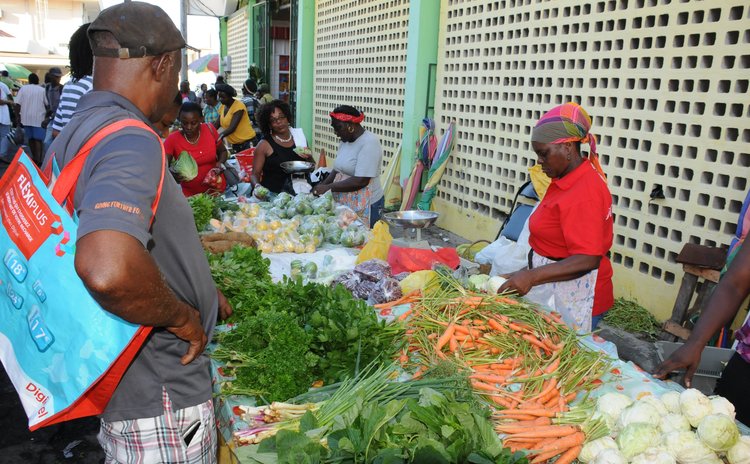Haitians living in Dominica should have been our #FoodHeroes on World Food Day 2020

With just a speech, and a few other minor events, from the Minister for Agriculture-now identified with the exotic-sounding name, the Minister of Blue and Green Economy- Dominica joined the rest of the world in the observance of World Food Day (WFD) 2020 on Friday October 16.
In this unusual circumstance of the raging COVID-19 pandemic, we anticipated not only a speech but a much grander focus on food and food security on WFD. But that did not happen.
We were disappointed because after all the FAO, also celebrating its 75th birthday, urged member states to give added attention to the issue of food security on WFD.
"The current health crisis initiated by Coronavirus pandemic has made us all sit up and take note of the importance of maintaining our health", the FAO said in a bulletin for WFD 2020. "The need of consuming nutritious food got the long-due impetus and the problem of food scarcity got the attention it really needed".
Because of the havoc to health and economy that COVID-19 is causing all over the world, the FAO selected the theme: "Nourish. Sustain. Together. Our Actions Are Our Future."
So during WFD 2020 Dominicans should have taken the opportunity to talk about the availability and the absolute necessity of nutritious food, to build the immune system, in the era of COVID-19 but also to discuss the real, as opposed to the delusional, state of agriculture in Dominica even before COVID-19.
We should have noted that the FAO has stated that the world is "off tract" to meeting the Sustainable Development Goals (SDG); that is, the world is NOT going to meet most of the food and agriculture-related SDG targets by 2030.
"According to the latest data … collected before the COVID-19 pandemic, progress remains insufficient in the food and agriculture domain, suggesting that the world is not on track to meet the relevant targets by 2030", the FAO stated. "Now, due to COVID-19, an unprecedented health, economic and social crisis is threatening lives and livelihoods, making the achievement of these targets even more challenging".
For Dominica and the rest of the world, the threat of hunger for millions is real.
"The most recent 2019 estimates show that prior to the pandemic, nearly 690 million people, or 8.9 percent of the world population, were hungry – up by 10 million people in one year and by nearly 60 million in five years," the FAO stated. "Globally, moderate or severe food insecurity rose between 2015 and 2019, and now affects an estimated 25.9 percent of the world population – about 2 billion people, with women being more likely than men to face moderate or severe food insecurity".
In Latin America and the Caribbean, according to the FAO, there were 48 million undernourished people in 2019. "The region has seen a rise in hunger in the past few years, with the number of undernourished people increasing by 9 million between 2015 and 2019".
Because we are now observing thousands of poorly nourished and obese people all around us that should be the incentive to continue striving to drive agriculture from the permanent low-tech, rudimentary operation in the control mostly of peasant and subsistence farmers that it has been for decades.
Most importantly, we need to reassess and take control of our food import bill. This is important because the island's current actions and policies are driving the population towards the consumption of imported foodstuffs rather than utilising locally grown produce.
And that is why on WFD, as the FAO suggested, we should have acknowledged, not only Dominica-born food producers but the hundreds of Haitian women and men who have settled here in recent years, and who have been at the forefront of our efforts at food production and distribution.
Almost everyone in the region will agree with the view that the issue of food production and consumption is extremely important. But we just talk about it at the CARICOM-talk-a-thorns.
The fact that CARICOM spends more than US$3.5 billion in extra regional food imports should propel farmers of the region towards taking immediate steps to alter the situation. It is also conspicuously obvious that we cannot keep siphoning our wealth to foreign farmers while our country continues to be burdened with high rates of joblessness and a deepening social and economic crisis especially in rural areas.
So, there are valid reasons why government must put additional focus on agriculture now, especially during the period of the COVID-19 pandemic.
But we can assure you that words alone will not solve the problems of agriculture. Government, in particular, has to take extraordinary measures to promote and protect domestic production.
In addition, to begin the process of recovery, government must stop spreading the misinformation, the alternative reality, that agriculture is in good health. It is not; it is a gross exaggeration.
Dominica has long way to go before it arrives at that critical juncture when agriculture is productive again. But if the country ignores food production and distribution then levels of poverty, malnutrition as well as non-communicable diseases will continue to increase. That added to the threat of COVID-19 is a deadly combination.
So, WFD-2020 that we unenthusiastically observed last week, was no ordinary WFD and as the FAO suggested, we needed "anything but ordinary action". Unfortunately, we missed that opportunity.




